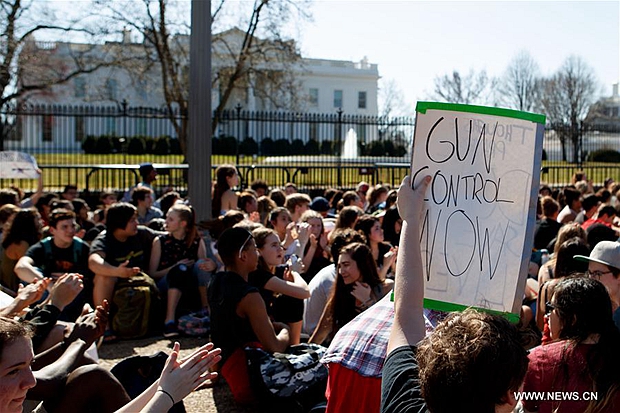Legislation is the only solution to US gun violence


One more tragic school shooting has happened in Florida recently. With three of the deadliest mass shooting incidents happening in the last five months, the ineffectiveness and inaction of the authorities concerned has left many Americans baffled and seriously worried about their safety. Incurring a varying amount of casualties, these incidents are frequent, with the one in Florida being the 18th this year. Notwithstanding the crisis, the US continues to be one of the few countries – the others being Haiti, Guatemala and Mexico – that consider owning a gun a constitutional right, and this legal right has never been as controversial as it is now.
Enabling easy access to firearms has resulted in the US leading in statistics of gun-related homicides. Though it only constitutes 4.4 percent of the world population, half of civilian-owned guns worldwide are in the US Widespread gun ownership remains the primary reason for frequent shooting incidents. Research has also established that only 4 percent of such incidents are caused by mental instability. Diverting the discourse to focus on mental instability only prolongs the crisis and raises risks for innocent citizens. As categorically stated by Jessica Henderson Daniel, president of the American Psychological Association, "Framing the conversation about gun violence in the context of mental illness does a disservice both to the victims of violence and unfairly stigmatizes the many others with mental illness."
Nowadays, more than one shooting takes place every day on average in America, and since 1995 nearly seven children or teenagers on average have lost their lives every day due to guns. Strict gun control is urgently needed, especially to restrict the availability of war-worthy weapons with high-capacity magazines. Even now, weapons like the AR-15 rifle used in the Parkland school shooting can be legally purchased by almost anybody above 18 years of age; it happens to be the weapon of choice for killers and surprisingly even easier to purchase than a handgun. As Peter J. Forcelli from the Bureau of Firearms and Explosives in Miami emphasized, "No laws were violated in the procurement of this weapon."
The Parkland school shooting incident has received more attention than usual, leading to a lot of soul-searching. Disturbing factors have come to light regarding this incident, such as the right-wing leanings of the accused and the fact that he had recently availed himself of paramilitary training with the Army Junior Reserve Officer Training Corps. Designed to encourage youngsters to join the army, this program may have to be offered with more caution in the future.
Moreover, social media posts by the accused revealed he aspired to be a "shooter." Apparently the FBI knew about this but failed to take action, and people are wondering why the authorities were not more proactive. Nothing conclusive has been achieved as yet, and students are quite worried. As 17-year-old student David Hogg from the Parkland school wondered, "If we're constantly having our children worried about getting shot at, what are we telling our future? And that's what these people are killing, our future." Consequently, students have organized nationwide rallies and walkouts to press for stricter gun legislation.
Far and wide, citizens are pressuring their political representatives to take a stand on gun safety and have initiated checks to see which politicians receive hefty donations from the gun lobby. The most powerful organization is the National Rifle Association, with wealthy members and a highly effective and vast grassroots base promoting a "gun culture," equating the pride of owning a gun with that of holding the national flag. People are also vehemently opposing another law yet to be passed, the Concealed Carry Permit, which would allow hidden weapons to be carried state to state. Certainly, a lot more action is being seen this time as people battle for new gun laws.
On the other side of the divide, some Americans continue to insist on owning firearms as a safeguard against shootings and attacks, thus preventing effective gun legislation. Now becoming a vicious circle, the more such incidents happen, the more gun sales increase. Corresponding with the number of guns available, the incidence of mass shootings also tends to escalate.
Such occurrences have happened in other countries as well but were tackled much more efficiently, such as in Australia after a deadly mass shooting in 1996. Banning weapons like semi-automatic rifles was the only answer, and there hasn't been any such event there since. Supporting gun lobbies just because they are influential and powerful, the complacency and insensitivity of US politicians has come under discussion. At the end of the day, gun legislation will be the only way to end the national crisis.
The author, Sabena Siddiqui, is a foreign affairs journalist and lawyer based in Pakistan.



































